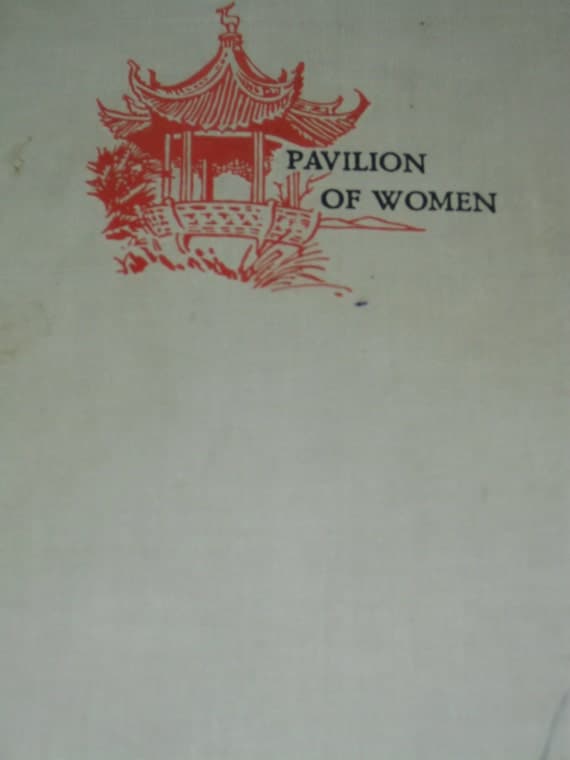REVIEW of PAVILION OF WOMEN by PEARL BUCK
PAVILION OF WOMEN
Pearl S. Buck
1946
Moyer Bell
SUMMARY
On her fortieth birthday, Madame Wu carries out a decision she has been planning for a long time: she tells her husband that after twenty-four years their physical life together is now over and she wishes him to take a second wife. The House of Wu, one of the oldest and most revered in China, is thrown into an uproar by her decision, but Madame Wu will not be dissuaded and arranges for a young country girl to come take her place in bed. Elegant and detached, Madame Wu orchestrates this change as she manages everything in the extended household of more than sixty relatives and servants. Alone in her own quarters, she relishes her freedom and reads books she has never been allowed to touch. When her son begins English lessons, she listens, and is soon learning from the "foreigner," a free-thinking priest named Brother Andre, who will change her life. Few books raise so many questions about the nature and roles of men and women, about self-discipline and happiness.
REVIEW
Rarely have I read a book that has made me think so deeply about relationships and ideas that I take for granted every day. Andre, the foreign priest, is surprised that Madame Wu has learned so much about the world within her small sphere of daily life, the high walls of her compound. Andre has seen much of the world and speaks many languages, but Madame Wu keeps up with his intellect and ideas, and this is surprising to him. She explains that everything that happens out in the world happens in the walls of the compound: birth, conflict, joy, sorrow, marriage, death. No sphere is so small that a person cannot learn all that the human experience has to offer.
Pearl Buck allows her characters to be dynamic, and this is one of the things that makes her writing so satisfying. Madame Wu isn't terribly likable at the beginning of the story. Although she's admirable, she doesn't seem quite real because she's so cold and calculating. Buck allows her protagonist to mess up bigtime, which can be tough for an author to do. And because Madame Wu wields so much power, she can really mess things up for other people.
So when she begins to change and her steely exterior starts to crumble, it's mesmerizing to see what happens. This is what we all hope for: the ability to overcome weaknesses (even when our weaknesses appear to be strengths) and have the wisdom and courage to try and right the wrongs of our former ignorance.
Madame Wu has always respected learning, but she has felt that some learning is dangerous and that it will ultimately ruin the family life she has so carefully orchestrated for her husband and children. The world of new ideas and learning, introduced to the Wu household through a foreigner, impacts everyone, whether they embrace the new ideas or not, and one of the sons really catches on to the possibilities for common people when they have the skills and power to read and write.
The subtitle on my library copy says, "A novel of traditional China," but it's really, "a novel of human wisdom," for any and all.
Pearl S. Buck
1946
Moyer Bell
SUMMARY
On her fortieth birthday, Madame Wu carries out a decision she has been planning for a long time: she tells her husband that after twenty-four years their physical life together is now over and she wishes him to take a second wife. The House of Wu, one of the oldest and most revered in China, is thrown into an uproar by her decision, but Madame Wu will not be dissuaded and arranges for a young country girl to come take her place in bed. Elegant and detached, Madame Wu orchestrates this change as she manages everything in the extended household of more than sixty relatives and servants. Alone in her own quarters, she relishes her freedom and reads books she has never been allowed to touch. When her son begins English lessons, she listens, and is soon learning from the "foreigner," a free-thinking priest named Brother Andre, who will change her life. Few books raise so many questions about the nature and roles of men and women, about self-discipline and happiness.
REVIEW
Rarely have I read a book that has made me think so deeply about relationships and ideas that I take for granted every day. Andre, the foreign priest, is surprised that Madame Wu has learned so much about the world within her small sphere of daily life, the high walls of her compound. Andre has seen much of the world and speaks many languages, but Madame Wu keeps up with his intellect and ideas, and this is surprising to him. She explains that everything that happens out in the world happens in the walls of the compound: birth, conflict, joy, sorrow, marriage, death. No sphere is so small that a person cannot learn all that the human experience has to offer.
Pearl Buck allows her characters to be dynamic, and this is one of the things that makes her writing so satisfying. Madame Wu isn't terribly likable at the beginning of the story. Although she's admirable, she doesn't seem quite real because she's so cold and calculating. Buck allows her protagonist to mess up bigtime, which can be tough for an author to do. And because Madame Wu wields so much power, she can really mess things up for other people.
So when she begins to change and her steely exterior starts to crumble, it's mesmerizing to see what happens. This is what we all hope for: the ability to overcome weaknesses (even when our weaknesses appear to be strengths) and have the wisdom and courage to try and right the wrongs of our former ignorance.
Madame Wu has always respected learning, but she has felt that some learning is dangerous and that it will ultimately ruin the family life she has so carefully orchestrated for her husband and children. The world of new ideas and learning, introduced to the Wu household through a foreigner, impacts everyone, whether they embrace the new ideas or not, and one of the sons really catches on to the possibilities for common people when they have the skills and power to read and write.
The subtitle on my library copy says, "A novel of traditional China," but it's really, "a novel of human wisdom," for any and all.


Comments
Post a Comment